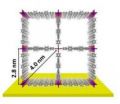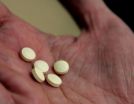(Press-News.org) Researchers at Johns Hopkins Medicine in November surgically implanted a pacemaker-like device into the brain of a patient in the early stages of Alzheimer's disease, the first such operation in the United States. The device, which provides deep brain stimulation and has been used in thousands of people with Parkinson's disease, is seen as a possible means of boosting memory and reversing cognitive decline.
The surgery is part of a federally funded, multicenter clinical trial marking a new direction in clinical research designed to slow or halt the ravages of the disease, which slowly robs its mostly elderly victims of a lifetime of memories and the ability to perform the simplest of daily tasks, researchers at Johns Hopkins say. Instead of focusing on drug treatments, many of which have failed in recent clinical trials, the research focuses on the use of the low-voltage electrical charges delivered directly to the brain. There is no cure for Alzheimer's disease.
As part of a preliminary safety study in 2010, the devices were implanted in six Alzheimer's disease patients in Canada. Researchers found that patients with mild forms of the disorder showed sustained increases in glucose metabolism, an indicator of neuronal activity, over a 13-month period. Most Alzheimer's disease patients show decreases in glucose metabolism over the same period.
The first U.S. patient in the new trial underwent surgery at The Johns Hopkins Hospital, and a second patient is scheduled for the same procedure in December. The surgeries at Johns Hopkins are being performed by neurosurgeon William S. Anderson, M.D.
"Recent failures in Alzheimer's disease trials using drugs such as those designed to reduce the buildup of beta amyloid plaques in the brain have sharpened the need for alternative strategies," says Paul B. Rosenberg, M.D., an associate professor of psychiatry and behavioral sciences at the Johns Hopkins University School of Medicine, and site director of the trial's Johns Hopkins location. "This is a very different approach, whereby we are trying to enhance the function of the brain mechanically. It's a whole new avenue for potential treatment for a disease becoming all the more common with the aging of the population."
Some 40 patients are expected to receive the deep brain stimulation implant over the next year or so at Johns Hopkins and four other institutions in North America as part of the ADvance Study led by Constantine G. Lyketsos, M.D., M.H.S., a professor of psychiatry and behavioral sciences at the Johns Hopkins University School of Medicine, and Andres Lozano, M.D., Ph.D., chairman of the neurology department at the University of Toronto. Only patients whose cognitive impairment is mild enough that they can decide on their own to participate will be included in the trial.
Other sites performing the operation, supported by the National Institutes of Health's National Institute on Aging (R01AG042165), are the University of Toronto, the University of Pennsylvania, the University of Florida, and Banner Health System in Phoenix, Ariz. The medical device company, Functional Neuromodulation Ltd., is also supporting the trial.
"We are very excited about the possibilities of this potentially new way to treat Alzheimer's," says Lyketsos, director of the Johns Hopkins Memory and Alzheimer's Treatment Center in Baltimore.
While experimental for Alzheimer's patients, more than 80,000 people with the neurodegenerative disorder Parkinson's disease have undergone the procedure over the past 15 years, with many reporting fewer tremors and requiring lower doses of medication afterward, Lyketsos says. Other researchers are testing deep brain stimulation to control depression and obsessive-compulsive disorder resistant to other therapies.
The surgery involves drilling holes into the skull to implant wires into the fornix on either side of the brain. The fornix is a brain pathway instrumental in bringing information to the hippocampus, the portion of the brain where learning begins and memories are made, and where the earliest symptoms of Alzheimer's appear to arise. The wires are attached to a pacemaker-like device, the "stimulator," which generates tiny electrical impulses into the brain 130 times a second. The patients don't feel the current, Rosenberg says.
For the trial, all of the patients will be implanted with the devices. Half will have their stimulators turned on two weeks after surgery, while the other half will have their stimulators turned on after one year. Neither the patients nor the doctors treating them will know which group gets an early or later start.
"Deep brain stimulation might prove to be a useful mechanism for treating Alzheimer's disease, or it might help us develop less invasive treatments based on the same mechanism," Rosenberg says.
By 2050, the number of people age 65 and older with Alzheimer's disease may triple, experts say, from 5.2 million to a projected 11 million to 16 million, unless effective treatments are found.
###
For more information:
http://www.hopkinsmedicine.org/psychiatry/specialty_areas/memory_center/research.html END
New York, NY—December 5, 2012—Computer scientists at Columbia's School of Engineering and Applied Science have published a study in the November 2012 issue of The American Journal of Human Genetics (AJHG) that demonstrates a new approach used to analyze genetic data to learn more about the history of populations. The authors are the first to develop a method that can describe in detail events in recent history, over the past 2,000 years. They demonstrate this method in two populations, the Ashkenazi Jews and the Masai people of Kenya, who represent two kinds of histories ...
This press release is available in German.
Researchers of the KIT Institute of Functional Interfaces (IFG), Jacobs University Bremen, and other institutions have developed a new method to produce metal-organic frameworks (MOFs). By means of the so-called liquid-phase epitaxy, the scientists succeeded in producing a new class of MOFs with a pore size never reached before. These frameworks open up interesting applications in medicine, optics, and photonics. The new class of MOFs, called "SURMOF 2", is presented in the "Nature Scientific Reports" journal.
Metal-organic ...
BLOOMINGTON, Ind. -- At a Bloomington, Ind., toy store, kids ages 8 to 12 gather weekly to trade Pokemon cards and share their mutual absorption in the intrigue and adventure of Pokemon.
This may seem an unlikely source of material to test theories in cognitive neuroscience. But that is where Indiana University brain scientists Karin Harman James and Tom James were when an idea took hold.
"We were down at the club with our son, watching the way the kids talked about the cards, and noticed it was bigger than just a trading game," Tom James said.
Pokemon has since ...
PHILADELPHIA — Roughly one-fifth of Americans take low-dose aspirin every day for heart-healthy benefits. But, based on either urine or blood tests of how aspirin blocks the stickiness of platelets – blood cells that clump together in the first stages of forming harmful clots – up to one third of patients are deemed unlikely to benefit from daily use. Such patients are called "aspirin resistant." Clots are the main cause of most heart attacks and strokes.
In people who have suffered a heart attack, low-dose aspirin reduces the chances of a second event by about one fifth, ...
PROVIDENCE, R.I. – If you're thinking that little old lady driving 35 miles per hour in the passing lane shouldn't be behind the wheel, you may be right. Studies at Rhode Island Hospital, and elsewhere, have shown that our driving abilities decline with age, and for those with cognitive issues such as dementia, it can be even worse.
A standardized road test – much like the one teenagers take to receive their learner's permit and driver's license – is often used to measure an individual's performance, including those of older adults. But researchers at the Rhode Island ...
GAINESVILLE, Fla. — A new study co-authored by a University of Florida researcher provides the first direct chronological test of sequence stratigraphy, a powerful tool for exploring Earth's natural resources.
The model allows geologists to better understand how sedimentary rocks are related to one another in time and space and predict what types of rocks are located in different areas. The information may help scientists more reliably interpret various aspects of Earth's history such as long-term climate changes or extinction events, and also benefit companies searching ...
University of Rochester Medical Center scientists are testing a new approach to speed a patient's recovery of blood counts during a vulnerable period after a stem-cell transplant, according to a study published in the journal Stem Cells.
Laura M. Calvi, M.D., and Rebecca L. Porter, an M.D./Ph.D. student in Calvi's lab, reported that prostaglandin E2 (PGE2), a drug previously used to treat stomach ulcers, boosts blood production following an assault on the bone marrow from radiation or chemotherapy. Although their study was done in mice, Calvi believes it has significance ...
A new study finds differences in the ways that participation in Alcoholics Anonymous (AA) helps men and women maintain sobriety. Two Massachusetts General Hospital (MGH) investigators found that, while many factors are helpful to all AA participants, some were stronger in men and some in women. For example, avoidance of companions who encourage drinking and social situations in which drinking is common had more powerful benefits for men, while increased confidence in the ability to avoid drinking while feeling sad, depressed or anxious appeared to be more important for ...
VIDEO:
New research from Western University could lead to better treatments for Post-Traumatic Stress Disorder (PTSD) and drug addiction by effectively blocking memories. Steven Laviolette and Nicole Lauzon describe how...
Click here for more information.
New research from Western University could lead to better treatments for Post-Traumatic Stress Disorder (PTSD) and drug addiction by effectively blocking memories. The research performed by Nicole Lauzon, a PhD candidate ...
ITHACA, N.Y. – A bit reminiscent of the Terminator T-1000, a new material created by Cornell researchers is so soft that it can flow like a liquid and then, strangely, return to its original shape.
Rather than liquid metal, it is a hydrogel, a mesh of organic molecules with many small empty spaces that can absorb water like a sponge. It qualifies as a "metamaterial" with properties not found in nature and may be the first organic metamaterial with mechanical meta-properties.
Hydrogels have already been considered for use in drug delivery – the spaces can be filled with ...


